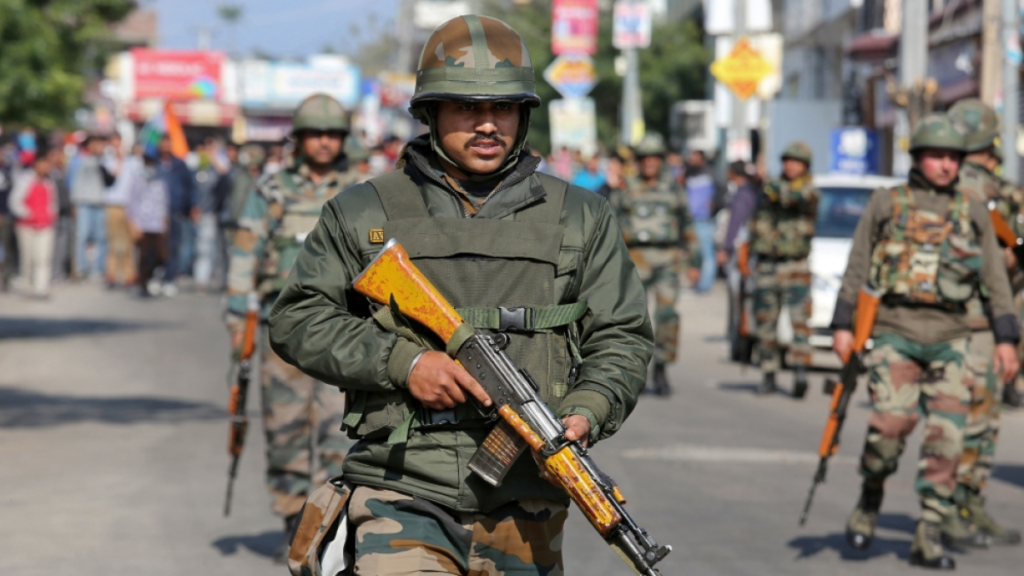In the early hours, troops from Pakistan and India trade gunfire along the line of control in the disputed region of Kashmir, as officials reported. This increase in tension follows the United Nations urging both nuclear countries to show “maximum restraint” after a deadly shooting in the area.
Relations between India and Pakistan have gotten much worse, as India accuses Pakistan of helping “cross-border terrorism” following a major attack on civilians in Kashmir, which is mostly Muslim, in 25 years.
Syed Ashfaq Gilani, a government official from Pakistan-administered Kashmir, informed Agence France-Presse that there was an exchange of fire between troops along the line of control, clarifying that civilians were not targeted.
The Indian army confirmed that there was limited small arms fire, which they attributed to Pakistan, and stated that they responded effectively. Three Indian army officials, who wanted to remain unnamed, said that Pakistani soldiers shot at an Indian position, leading to a response from Indian forces, but no casualties were reported.
Pakistan has not commented on the incident, and independent verification of the events has not been possible. Historically, both nations have accused each other of instigating border skirmishes in Kashmir, a territory both claim in its entirety.
India’s army chief, Gen Upendra Dwivedi, is scheduled to conduct a high-level security review in Srinagar, Indian-administered Kashmir, following the militant attack that resulted in the deaths of 26 civilians, marking one of the worst events in recent years.
The brazen attack, which occurred in a mountain meadow near Pahalgam, has undermined Prime Minister Narendra Modi’s claims of restored peace in the volatile region and has heightened tensions between the two nuclear powers.
In response, the Indian army has initiated extensive “search-and-destroy” operations, deployed surveillance drones, and increased troop presence throughout the Kashmir Valley. A manhunt is currently underway for three suspects, including one Indian national and two Pakistanis.
On Friday morning, authorities in Indian Kashmir demolished the homes of two suspected militants, one of whom is linked to the recent attack, according to an official source.

ALSO READ: Tensions Rise: India Warns Pakistan Army Chief on Kashmir Sovereignty
As tensions increase, the UN has urged India and Pakistan to keep their cool. The two nations have taken mutual diplomatic measures following the deadly shooting in Kashmir.
Relations have reached a new low, with India accusing Pakistan of facilitating cross-border terrorism after the attack on civilians in the contested region.
“We strongly urge both governments to exercise maximum restraint and to prevent further deterioration of the situation,” stated UN spokesperson Stéphane Dujarric during a press briefing in New York. “We think that any problems between Pakistan and India should be solved peacefully through real conversations.”
The visit by Gen Dwivedi to the regional capital highlights a surge in military and diplomatic activity. India has commenced a large-scale air and naval exercise, which analysts suggest could lead to military action.
The Indian air force’s Gagan Shakti drills, featuring Rafale jets and elite strike units, have taken on increased urgency, while the navy has intensified its maneuvers and successfully test-fired a surface-to-air missile.
“There are many uncertainties that Modi must navigate, including the significant capabilities of the Pakistan army,” noted veteran analyst C Raja Mohan in the Indian Express. “However, given the horrific nature of the attack and the national outrage, as victims came from 15 different states across India, the Prime Minister may feel compelled to take significant risks.”
On the diplomatic front, India’s foreign secretary, Vikram Misri, briefed envoys from 25 nations, including key G20 partners, Gulf states, and notably, China. Including Beijing, despite strained relations, was seen as an effort to garner broader international support.
India has presented what it claims is “clear evidence of cross-border involvement.” An obscure group named the Resistance Front has taken responsibility for the attack, which Indian officials allege is a group that acts on behalf of the Pakistan-based Lashkar-e-Taiba or a similar group. Islamabad has denied any involvement, accusing India of failing to provide evidence.

In a speech after the attack, Prime Minister Modi promised to catch the gunmen who killed 28 civilians, saying that Indian police have identified two of the three attackers as being from Pakistan.
“I assure everyone: India will locate, monitor, and punish all terrorists and their backers,” Modi declared. “We will look for them everywhere they might be.
Denying any connection, Pakistan dismissed attempts to link it to the Pahalgam attack as “frivolous” and pledged to respond firmly to any Indian actions.
“Any threat to Pakistan’s independence and the safety of its people will be answered with strong actions on all levels,” a statement from Pakistan said after a special security meeting led by Prime Minister Shehbaz Sharif and top military leaders.
Since gaining independence in 1947, Kashmir has been divided between India and Pakistan, with both nations claiming the territory in full while governing separately.
MUST READ: Pahalgam Attack Aftermath: Economic Ramifications for Pakistan Due to Attari Closure










